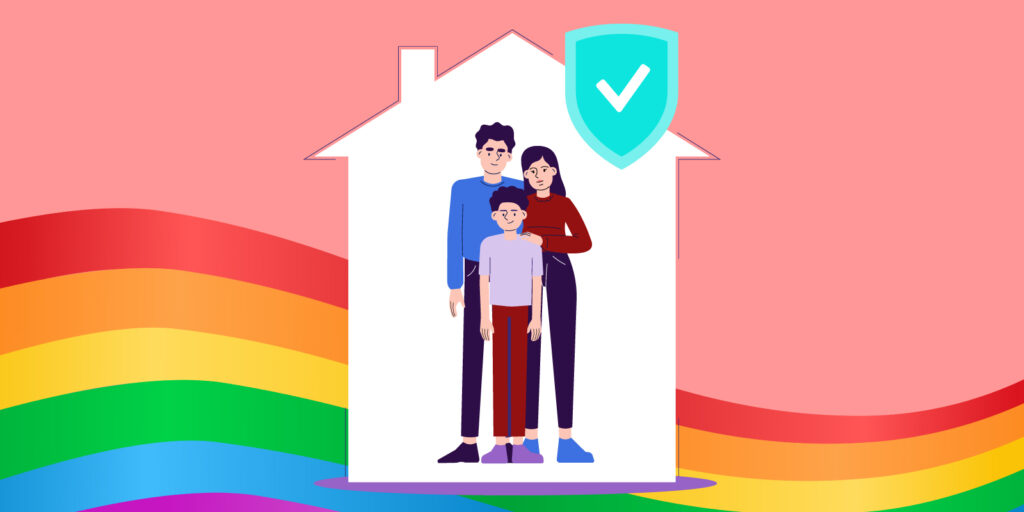Members of the LGBTQ community often face discrimination that makes it difficult to achieve financial stability. For example, some employers discriminate on the basis of sexual orientation, leaving fewer job opportunities available to gay, lesbian, bisexual, transgender and queer applicants.
Although this type of discrimination is against the law, nearly 50% of LGBTQ individuals have faced job discrimination at some point in their lives. If you’re concerned about your family’s financial stability, purchasing life insurance is an important step. Read on to learn about some important LGBTQ life insurance considerations and find out how to obtain an insurance policy that meets your unique needs.
Financial Stability in the LGBTQ Community
LGBTQ-friendly cities tend to have higher-than-average costs of living, making it difficult to find affordable housing. Some landlords and property managers also refuse to rent to same-sex couples or engage in other forms of discrimination against LGBTQ individuals. As a result, applicants may have to spend more than they can really afford to find safe, stable housing.
Access to quality healthcare is also a concern for members of the LGBTQ community. Some healthcare providers discriminate against LGBTQ patients or lack awareness regarding an LGBTQ individual’s needs. To avoid discrimination and insensitivity, members of the LGBTQ community may avoid preventive care, causing them to develop chronic health conditions that are expensive to treat. The resulting medical bills can eat away at a family’s savings or put an individual into debt, resulting in a precarious financial situation.
Reasons to Purchase LGBTQ Life Insurance
Anyone can benefit from having a life insurance policy, but this type of insurance is especially helpful for same-sex couples or families with at least one LGBTQ member. Here are the top reasons to consider purchasing LGBTQ life insurance:
- A good life insurance policy protects family members in the event of an LGBTQ individual’s untimely death. The proceeds of such a policy can replace the deceased person’s income, leaving the family on a firmer financial footing.
- Since LGBTQ youth have a higher risk of developing cancer, heart disease and other chronic health conditions compared to the general population, they may have thousands of dollars in unpaid medical bills when they die. In some states, the law permits hospitals and other healthcare facilities to hold a patient’s children responsible for their unpaid debts. The funds from a life insurance policy can be used to cover medical bills and other expenses, ensuring family members don’t have to use their own funds to pay.
- When you purchase life insurance, you get to name at least one beneficiary on your policy. If you’re not married, naming your partner as a beneficiary ensures that they receive the proceeds of the policy when you die. Without this protection, your estate may automatically pass to your closest relative, even if you wanted your partner to have the money.
- In most cases, life insurance proceeds aren’t taxable. If you pass away, your family will get the full value of the policy, leaving them with more money to cover your final expenses and replace your income.
- Unfortunately, not everyone accepts an LGBTQ individual’s identity or relationships. If someone in your family tries to contest your will, having life insurance in place ensures that your partner receives an inheritance. They can use the funds to cover their living expenses or hire an attorney to represent them in probate court.
How to Find the Right Life Insurance Policy

Now that you understand the benefits of LGBTQ life insurance, it’s time to shop for a policy. Although the process is very similar for LGBTQ and non-LGBTQ individuals, there are a couple of key differences you need to know about. First, transgender individuals may need to submit their medical records, notes from mental health professionals or copies of modified birth certificates and other documents used for identification purposes. To save time, have this information available before you submit your application.
Second, there are some unique considerations for individuals living with HIV. You may have to purchase a guaranteed-issue policy, which is a type of life insurance issued without medical exams or questionnaires. Another option is to purchase accidental death benefit insurance. This type of policy won’t pay out if you die of HIV, cancer or other natural causes, but it will pay out if you die in some type of accident. For example, accidental death benefits kick in when someone dies in an auto accident or drowns in a swimming pool.
Whole Life vs. Term Life
You also need to think about whether you want to purchase whole life or term life insurance. Whole life, also known as permanent life insurance, protects your family and accumulates cash value. This type of insurance is helpful if you’re behind on your retirement savings or earn too much money to contribute to a Roth IRA, as you can use the cash value to supplement your retirement income. Some companies also pay dividends to their whole life policyholders, giving you yet another source of funds.
Whole life protects you for as long as you pay the premium, while term life protects you only for a certain amount of time. This amount of time is known as the policy term. Many companies offer terms ranging from 5 to 30 years, giving you some flexibility as you work to protect your family from financial harm. Term life insurance pays the same death benefit no matter when you die, while decreasing term life insurance has a death benefit that decreases over time.
Give Yourself Peace of Mind
LGBTQ individuals have some unique considerations when it comes to purchasing life insurance. Although no one likes to think about dying, it’s important to plan ahead, especially if you believe there’s a good chance someone will contest your will when you pass away. If you need more information about LGBTQ life insurance, contact a trusted insurance professional in your area.
You might also be interested in: What Does Life Insurance Cover And Is It Worth It? [Plus 6 Common Plans]





